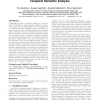366 search results - page 48 / 74 » Subjectivity Word Sense Disambiguation |
CICLING
2004
Springer
14 years 1 months ago
2004
Springer
: Syntactic disambiguation frequently requires knowledge of the semantic categories of nouns, especially in languages with free word order. For example, in Spanish the phrases pint...
NLDB
2010
Springer
13 years 11 months ago
2010
Springer
Analysis of blogpost writings is an important and growing research area. Both objective and subjective characteristics of a writer are detected. Words have word meaning that is com...
WWW
2011
ACM
13 years 2 months ago
2011
ACM
Computing the degree of semantic relatedness of words is a key functionality of many language applications such as search, clustering, and disambiguation. Previous approaches to c...
FLAIRS
2006
13 years 9 months ago
2006
The huge volumes of unstructured texts available online drives the increasing need for automated techniques to analyze and extract knowledge from these repositories of information...
CORR
1998
Springer
13 years 7 months ago
1998
Springer
Abstract. In many applications of natural language processing (NLP) it is necessary to determine the likelihood of a given word combination. For example, a speech recognizer may ne...

